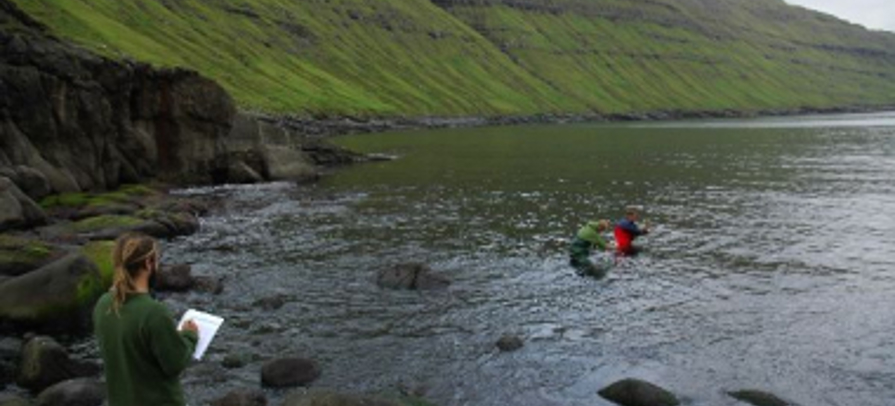Russell Fielding vart ph.d. ritgerð um grindaveiðu
8. oktober vardi Russell Fielding ph.d.ritgerð við Louisiana State University (LSU), Baton Rouge, USA. Heitið á ritgerðini er: Artisanal Whaling in the Atlantic: A Comparative Study of Culture, Conflict and Conservation in St. Vincent and the Faroe Islands
Í ritgerðini viðger og samanber Russell bæði grindaveiðu og eina røð av evnum rundanum hesa serligu siðvenju í Føroyum og á karribisku oynni St. Vincent. Hann spyr m.a. hvussu tað hevur borið til at varðveitt eina burðardygga hvalaveiðu her, tá tað ikki er eydnast aðra staðni.
Ritgerðin, sum er 445 síður, kann takast niður í PDf frá hesi síðuni.
Russell Fielding hevur fingið partvísa fígging til sína verkætlan úr Granskingargrunninum, les meira í stuðulsyvirlitinum.
Russell Fielding arbeiðir í løtuni sum undirvísari á Geography Department á University of North Carolina, Chapel Hill.
Øðrvísi mannagongd fyri verju
Mannagongdin fyri ph.dverju í USA er nakað ørvísi enn í Føroyum og grannalondum okkara og er eisini ymisk frá universitet til universitet, onkuntíð er eisini munur á praksis millum deildir. Við Department of Geography and Anthropology á LSU, har Russell var innskrivaður, er mannagongdin, at ph.d.kandidaturin velur 4 vísindastarvsfólk at vera við í eini ráðgevandi nevnd, Advisory Board. Ein av hesum verður formaður og "major professor" ella høvuðsvegleiðari. Dr. Kent Mathewson, Associate Professor of Geography, hevur verið høvuðsvegleiðari hjá Russel. Hini limirnir vóru Dr. Craig Colten, og Dr. William Rowe, sum báðir eru geografar og Dr. R. Eugene Turner, sum er oceanografur. Deildin tilnevndi eisini ein lim, hesin var Dr. Joseph Siebenaller, lívfrøðingur.
Hendan verjan var almen og byrjaði við at Russell í stuttum legði fram sína gransking og høvuðsúrslit. So fingu áhoyraranir høvi at seta spurningar, síðani vóru teir bidnir um at fara út. Aftaná vóru tað fólkini í ráðgevandi nevndini, sum settu spurningar og gjørdu viðmerkingar. At enda tóku tey støðu til, hvørt verjan var staðin, og tað var hon í hesum førinum.
Í Føroyum er ph.d. gongdin vanliga liðug, tá dómsnevndin aftaná verjuna hevur staðfest, at ph.d.kandidaturin hevur staðið. Á hesi deildini er mannagongdin, at nevndarlimirnir at enda koma við einum lista av uppskotum til endurskoðan og broytingar, áðrenn ritgerðin er endalig. harafturat koma teir eisini við uppskotum til framhaldandi útgávu av granskinagrúrslitunum. Hesi uppskot arbeiði Russell við nú fram til desember, har arbeiðið skal vera liðugt.
Enskur samandráttur av ritgerðini
Whalers from the Caribbean island of St. Vincent and the North Atlantic archipelago of the Faroe Islands hunt pilot whales and a variety of other small cetaceans for food. Vincentian whalers use harpoons, thrown by hand or fired from a modified shotgun mounted on the boat. Faroese whalers, using several dozen boats, work cooperatively to drive an entire pod of whales ashore, where shore‐based whalers are waiting to complete the kill with traditional whaling knives. Vincentian whaling traces its origins to the late nineteenth century. Records of Faroese whaling date to the late sixteenth century but the practice is thought to be much older, originating perhaps as early as the tenth century. The annual average take of all cetaceans is 305 in St. Vincent and 1,358 in the Faroe Islands.
Whaling is both culturally and practically significant in both locations, providing not only a connection to history, but a source of food as well. However, the continuation of both operations may be threatened by the presence of methyl‐mercury and other environmental pollutants in the tissues of the whales, which have been shown to have negative effects on human health. Additionally, both societies have had to negotiate the efforts of anti‐whaling organizations, who employ methods such as protest, boycotts, and interventionary attempts to disrupt whaling activities.
While the majority of whaling operations throughout the world have ceased completely,
owing to a severe decline in whale populations, the Vincentians and the Faroese have in place certain traditional conservation strategies to avoid overexploitation of the resource. Both societies place geographical limits upon the spaces in which whaling is allowed. The Faroese have codified certain traditional conservation practices into their legal codes including the power of whaling authorities to forbid whale drives to occur if conditions are not favorable or if the food that would result is not needed. Additionally, whaling in the Faroe Islands is conducted communally and the commercialization of whaling is forbidden. Vincentian whalers have cautiously engaged available technological advances, adopting certain technologies to aid their efforts but declining to adopt technologies that might lead to overexploitation of the resource.
Mynd: Mark Kozuch (c)
